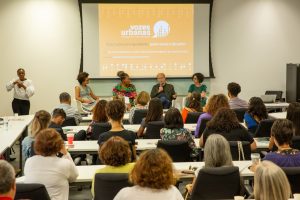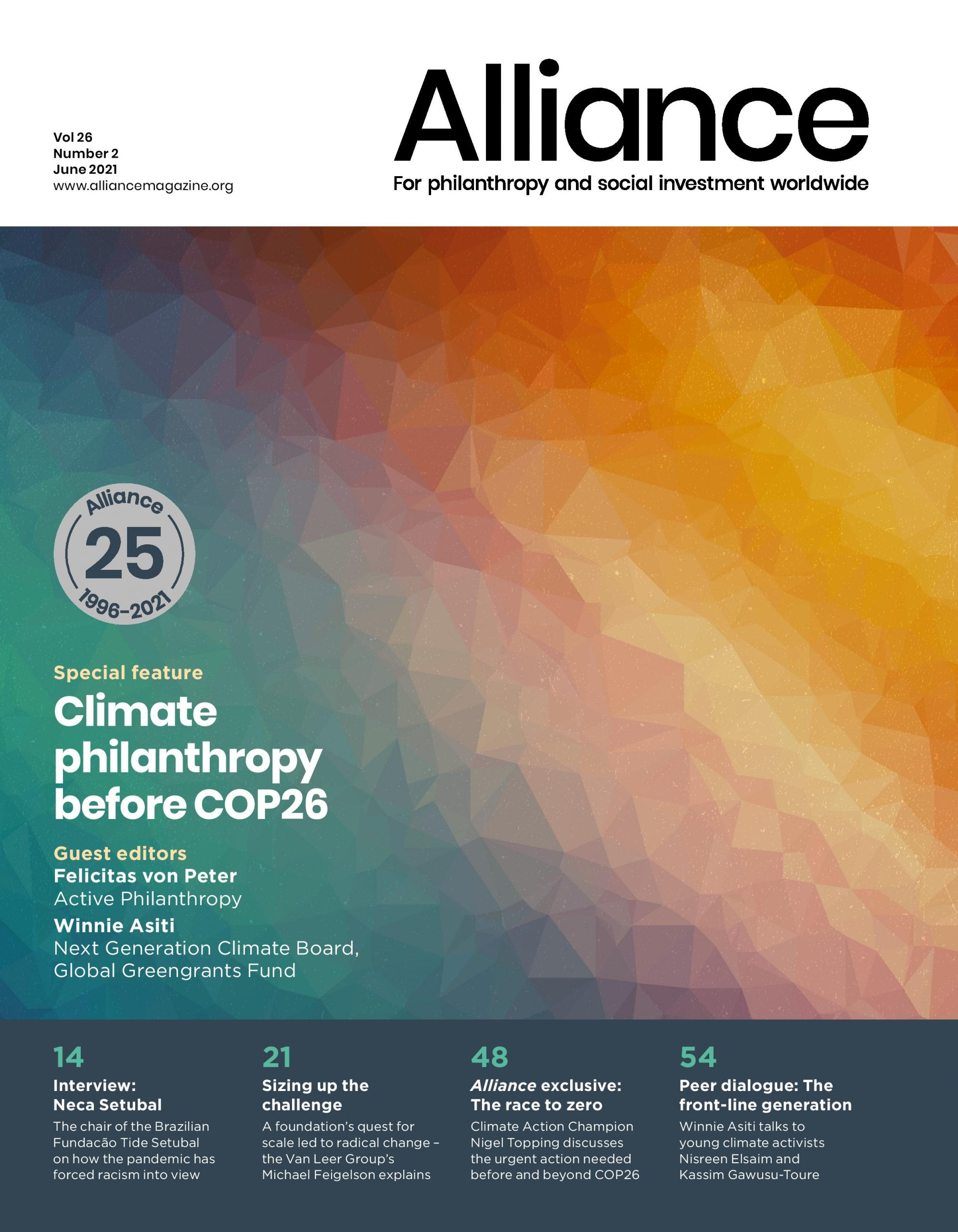
Neca Setubal. Credit: Tiago Queiroz
Fundacão Tide Setubal (FTS) has long experience of combatting racism in the suburbs of São Paulo. It’s a problem that has been ignored for too long by mainstream Brazilian society, but as Neca Setubal, chair of the foundation explains, the pandemic has helped to force it on public attention. She talks to Andrew Milner about the growing importance of Brazil’s civil society in the face of the obstacles the Bolsonaro government puts in the way of its work, the role of network body GIFE, which she also chairs, and the future of philanthropy in Brazil.
Inequality and racism at the sharp end
Andrew Milner: Inequality is a big focus for Fundacão Tide Setubal. Why is that?
Neca Setubal: Fundacão Tide Setubal really focuses on place, the outskirts of the east side of São Paulo and there are several dimensions to our concern. The main one is the inequalities between the outer suburbs and the central area of the cities.
And you deal with the outskirts because that’s where the inequalities are most marked?
Exactly. Inequality has a long history in the outer suburbs because of the segregation of these places in the development of the cities. This is not just a Brazilian problem but here in São Paulo, we have the richest city in Brazil, but also one of the most unequal, so there’s a big contrast between the richest and the poorest.
Presumably we’re not just talking about income inequality but things that follow from that like inequalities in health, education and so on?
Yes, and also infrastructural inequalities – the sanitary infrastructure, housing – and we are very concerned about race and gender inequality, so all our programmes have a transversal theme of gender and race. In Brazil, we have 54 per cent black people, more or less, but in the east zone of São Paulo, where most of our experience is concentrated, we have a 70 per cent black population and that means there is a big problem of poverty because poverty is very much associated with Brazil’s black population.
And that is because of discrimination and segregation?
Yes, we have a long history of discrimination and because of that, it’s always been difficult to face racism, but during the last year, with the case of George Floyd, there has been a change of attitude. This is the first time that different spaces have opened up in civil society, and we have been seeing many more black people in the media, in public life. There was a movement for this already, but it was not very visible and it was George Floyd’s death that brought it to the fore. There has also been affirmative action on quotas for university entrance so, for the first time, we have a generation of young black students who are educated and organised and they have helped make the movement much stronger. So the Black Lives Matter and the MeToo campaigns, international campaigns, have helped to give much more voice to movements on race and gender here in Brazil.
In GIFE we now have a network of members who support and learn from each other in their grantmaking. Again, family foundations are more likely to be grantmakers than corporate foundations.
You recently set up within the foundation a committee of inclusion and diversity. Is this part of the same process?
We set up the foundation in 2006 according to three principles: first, place matters, there are specific cultures and issues in each place. Second, we have to listen to people and, third, it’s important to design projects with people, not for them. Working in that way, we found people of great talents and diversity in the places we operated and we have developed a team of people from the outer suburbs, so there has been a natural evolution towards diversity in our team. Until 2015, we had been very focused on sustainable local development in the outer suburbs of east São Paulo, then we began to reflect on how we could apply our experience more widely so we began to focus more explicitly on socio-spatial inequalities in Brazilian cities in general.

Neca Setubal. Credit: Tiago Queiroz
Socio-spatial inequalities?
The inequalities produced by place, in our case by the segregation of the outer suburbs from the centre. But to go back to the committee, with the change of focus towards inequality we began to feel the need for a published commitment to diversity, not only racial, but in terms of gender, disability, sexual orientation etc, so the team selected a committee of five or six people and they wrote a statement of what diversity means for us and how we implement it within the foundation. During the last year, we have received a lot of requests to talk about our approach to diversity and share our experience, not only from other foundations but also other organisations, including private schools, because private schools in Brazil are over 90 per cent white students and teachers.
Can you tell me about the Galpao initiative, which I understand is one of FTS’ flagship projects?
It’s very important for us and for the neighbourhood, Jardim Lapena, where we are located. It’s a partnership between us and the residents of Jardim Lapena and it’s a good example of how we work with people, not for them. The centre acts as a hub for the neighbourhood. It’s open to everyone and we want people to feel that it’s their Galpao. They often say – especially the women – ‘it’s our place. It’s a place where we can feel recognised and respected.’ We have developed many kinds of partnership there. We have a community library that’s a partnership with the local government, we have a professional restaurant which runs catering courses, we have space for local entrepreneurs to co-work, we provide IT facilities and access to the internet and we have sport and exercise classes.
We need to construct a new way to work – more grantmaking, greater connection with people from the outskirts and we need to connect initiatives with their real needs.
Have the inequalities you work on become more marked due to the pandemic?
As everywhere, Covid-19 has been a big problem but the civil society sector, including foundations, has played an important part in dealing with those problems. The government – local as well as national – found it difficult to adapt, to change their way of working, so civil society and the private sector had a very important role throughout the pandemic and many partnerships between foundations and the business sector have formed and also with local governments, but at the level of the national government, frankly it’s a disaster, there’s no other word to describe it.

Controversial Brazilian president, Jair Bolsonaro. Credit: Jeso Carneiro
So the burden of dealing with the pandemic has fallen on civil society and the private sector, because the government has been slow to respond?
Not only did the national government fail to respond effectively, they really attacked civil society. This has made life difficult in the social sector because, first of all, we have to defend ourselves and to defend our democracy and on top of that, develop initiatives to counter the problems we are facing, which consumes our energy.
Do you mean they attack them in the media or that they actually impose restrictions on their operations?
In different ways. They attack them in the press, they are cutting almost all of the public policy boards. Under our constitution, boards were set up to advise on different areas of policy – education, environment and so on. These comprise 50 per cent government officials and 50 per cent civil society representation. Government has either suspended many of them, weakened them or just ignores them. There have also been direct attacks on NGOs. For instance, there was a very famous case in 2019, when members of a big NGO, Saúde e Alegria, which operates in the Amazon region, were jailed without any evidence on charges of being responsible for the wildfires in the region.
Since the Bolsonaro government came to power, has the role of Brazilian philanthropy become more important than ever?
Definitely. But it’s complicated because most of our foundations are linked to businesses which I think is very different from the UK and the US. Fundacão Tide Setubal is an exception. We are a family foundation with no links to a company and over the last ten years, the number of family foundations has increased but still the majority are linked to some enterprise. They have much less independence of action because they are very attached to the company’s brand and it’s very difficult for them to support projects in issues like democracy, violence, imprisonment of Indigenous people – issues that are more sensitive, let’s say. They are more active in areas that are less contentious like education and health. It tends to be family foundations who are more involved in controversial topics.

Credit: Paulo Pereira
The latest Censo GIFE also suggests that more foundations are now making grants as distinct from operating their own programmes.
In GIFE, we’ve put a lot of effort into encouraging this and we now have a network of members who support and learn from each other in their grantmaking. Again, family foundations are more likely to be grantmakers than corporate foundations. The reason is that at the beginning of the 1990s, when GIFE was created, the philanthropists who set it up were mainly from business and had no experience of how to work with the social sector so, initially, they supported NGOs to develop their own initiatives but, with time, they began to train their own people and some universities developed master’s degrees in philanthropy, so then corporate foundations began to set up their own projects, managed by their own people.
I see a lot of progress in this area especially among young people, who often prefer to invest in social impact businesses than to do philanthropy. It’s a generational attitude.
For me, that’s a big problem for two reasons. One is that it’s a loss for civil society because small organisations began to wither away for lack of support and civil society came to be more or less dominated by big business foundations. That reduces the diversity, the number of different voices of civil society. The second is that the focus came to be more on efficiency, which is OK, but equity tended to be left behind and also because they had to achieve results to show their boards, they began to develop projects from which it would be easy to show very concrete results over a very short timeframe and, as we know, often social issues can’t be solved by a programme of short duration.
Now – and I think the pandemic has helped here – foundations are more connected again to NGOs. I should also say that the business sector contributed a lot of good things to the philanthropy sector, too – to be more efficient, to evaluate results and so on – but the pandemic has certainly helped link the philanthropy sector with social realities.
What proportion of your funding goes in grants?
Last year was not typical because we entered into a lot of partnerships for which we managed the budget. Rs24 million ($4.4m) went to grantmaking and more or less Rs4 million ($0.73m) to our own projects. In 2019, Rs3m ($0.5m) was spent on projects inside the foundation and Rs2m ($0.37m) went to external projects so much less was spent than in 2020 because of the special circumstances of the pandemic.
How do you see the importance of GIFE in the development of Brazilian philanthropy?
I think GIFE’s role is very important. Before the pandemic I saw GIFE’s role as being a place where foundations could find information and learn from each other’s experiences. There are two other roles which I think are very important. One is to connect more with different kinds of civil society organisations, not just other foundations, the other is to encourage discussion of contemporary themes like race, environment, gender and public policy, not just the traditional issues that foundations support.
Many partnerships between foundations and the business sector have formed and also with local governments, but at the level of the national government, frankly it’s a disaster, there’s no other word to describe it.
I believe more and more foundations are becoming concerned with these issues and want to know how they can develop projects to address them. Something else that the pandemic has reminded us of is the demands of social welfare. A lot of our giving is very traditional and, before GIFE came along, was very linked to religion. GIFE tried to inspire a different form of philanthropy, so that’s where the term private social investing comes from, to distinguish it from more traditional giving and we almost forgot this idea of social welfare, but the pandemic reminded us we have to pay attention to very basic problems.
One of your roles was serving on the Board for Impact Investment and Impact Businesses. What progress has the idea of impact investing made in Brazil?
I think it’s growing. It’s a complex concept and a new one. Many times, I hear from investors, ‘no, I don’t want to invest in this social impact start-up, because I already have my philanthropy’ and there’s confusion over the fact that a lot of organisations no longer fit neatly into either the non-profit sector or the private sector. Even the banks aren’t clear about it. On the other side, in Brazil, we have many small businesses in the outer suburbs run by local people and they see themselves as social impact businesses even if it’s a for-profit enterprise because they are serving local communities. Despite these misunderstandings, I see a lot of progress in this area especially among young people, who often prefer to invest in social impact businesses than to do philanthropy. It’s a generational attitude, I think.

FTS event with the theme ‘Education for Equality: Panoramas and Challenges’. Credit: José/DiCampana Foto Coletivo
What have been the main changes in Brazilian philanthropy since you became involved in it?
The pandemic has been a turning point, because we have faced inequality and racism in a way we never did before. If you live in central São Paulo or the centre of many other cities, you can live your whole life and not see the people who live on the periphery. But with the pandemic, we have had to face these problems and we’ve begun to acknowledge that they are problems and that we in the foundation sector have to deal more directly with them. The pandemic has also made the people from the peripheries more visible and their voice is being heard more now and they have a different way of thinking about the problems than foundations, or the white population or the mainstream think about them. That’s important because they are new players.
We found people of great talents and diversity in the places we operated… so there has been a natural evolution towards diversity in our team.
We need to construct a new way to work – more grantmaking, greater connection with people from the outskirts and we need to connect initiatives with their real needs. We, as foundations, we might have beautiful projects, worthwhile projects, but they are not the ones that will make the real difference to inequality, to questions of gender and race, or environment. I have always said in GIFE that we have to be more strategic because we are a very small sector, especially in a country like Brazil which is so big, so we have to be more innovative and create innovations that could be scaled up through public policies. We also have to work more connectedly with each other. No one, not in any sector and not only in Brazil, can do anything alone.
You talk about scaling up successful initiatives, but that depends on government. Do you see the present government being receptive?
No, I don’t have any hope that the Bolsonaro government will work with foundations or civil society. No way. But local governments – and especially the foundations that work in education – worked very closely with different state governments during the pandemic. And that’s something else for us to do as a sector. We’re often critical of governments and I think it’s often because we don’t understand how they work or how to deal with them. There are many different interests at stake in politics and we have to think about the whole picture that they see and we don’t.
Andrew Milner is Associate Editor at Alliance.






Comments (0)